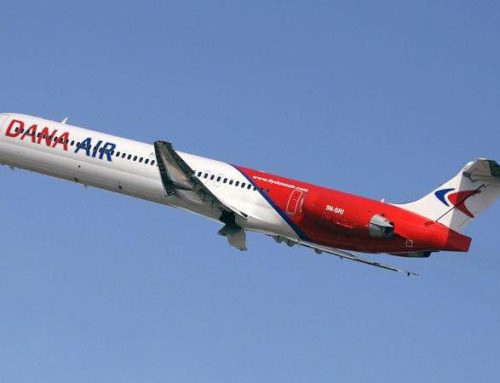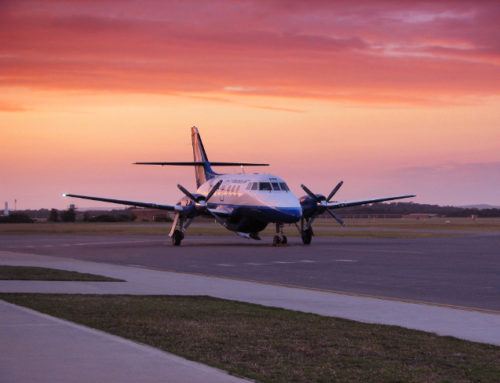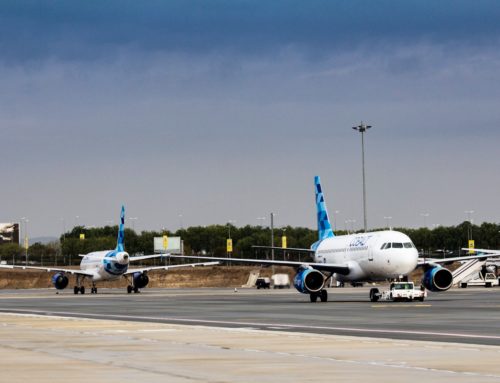In this issue of ch-aviation interviews we are meeting Antrak Air, a domestic airline from Ghana. The airline uses ATR72-500 aircraft and has been operating for over 10 years now in an environment where most airlines only last for a short period. Niels Trubbach talked with Antrak Air Chief Commercial Officer Kwaku Antwi-Boasiako.
Antrak Air – Airline Information
Antrak Air – Aircraft and Fleet List
Antrak Air – Airline Route Network
Is a turboprop aircraft the right aircraft in Ghana? You are operating turboprop aircraft while your competitors mostly use jet aircraft.
Antrak and Fly540 both operate the ATR 72-500 aircraft. Modern turboprops (like the ATR 72-500 & ATR 72-600) combine fuel efficiency and generally lower operational cost with jetliner cabin comfort. Given the short sectors that we operate in Ghana (longest 75 minutes for Tamale), modern turboprop seems to be the appropriate aircraft for domestic operations. That is even more significant given the high cost of aviation fuel in Ghana. That said, it is conceivable that future market conditions will require a rethink.
On the other side: Can your competitors reach higher fares through their jet aircraft?
That is so, jet operators charge higher fares and that is understandable due to relatively higher cost of operations. In the end, it comes down to market share and maximization of profit. We are happy with our current market share and hopefully, once we switch to dry lease, we can lower our costs and operate more efficiently and profitably.
Looking at the development of the market. How was the situation when you started?
Prior to September 2003 when Antrak and CiTylinK both started domestic operations, there were basically no scheduled air transport services for the general public.
What were the main challenges during the start-up process?
Unlike today that it is relatively easier to acquire an Air Carriers Licence (ACL) and an Air Operator Certificate (AOC), it took the better part of 2 years for the authorities to grant Antrak its licence to operate. That was the biggest challenge. The other major challenge was to convince the public about the safety of air travel, given the fatal accident 3 years earlier that involved an aircraft operated by the Ghana Air Force. Then also, given the general economic conditions at the time, the fares seemed high for many ordinary travellers, though the fares were not much higher than they are for peak flights today.
Over the last decade the economy in Africa has changed a lot. What were the most important steps for the development of your airline and the market overall?
Growth in the Ghanaian economy, particularly with the discovery and commercial production of oil, started the growth in the aviation sector, particularly for the business community. Antrak and CiTylinK both took advantage of the environment and opened up new routes and schedules, especially on the Accra-Takoradi sector. That led to some growth in passenger throughput between 2010 and 2011, largely from corporate clientel but also some reasonable patronage from the general public. For the general public though, it is fair to say that the liberalization policy of the Ghana Civil Aviation Authority that led to the entry of Starbow and Fly540 in late 2011, should be credited with generating the major boost to the development of the domestic aviation market, especially on the Accra-Kumasi route, from the last quarter of 2011 to date.
In the recent years new airlines have started operations in Ghana. Is the market growing as fast as the capacity does or is the capacity growing faster than the market, resulting in lower fares?
Most observers would agree that there is over-capacity in the market, and operators have rightly been worried. Overcapacity has led to intense competition that has led to low fares. The current size of the market (778,466 passenger throughput in 2013) is not big enough for the 4 active airlines. The authorities have announced that no new licences will be issued for domestic operations for the time being.
To understand the market: Who is the standard air passenger within Ghana?
At the moment, given the low fares, almost everybody is a standard air passenger. You have the regular business travellers from the mining, oil and gas, financial services, and other business sectors, government and other public officials, individual traders, students (especially in tertiary institutions), foreign tourists, NGO workers and individuals travelling over the weekend for funerals and other family engagements.
Aside of other airline companies, who do you compete against? How high is the fare difference to for instance bus services? Do you see an increasing number of passengers, that are willing to pay more for flight ticket instead using a bus?
Aside of other airlines, there are bus operators. The average airfare is about 4 times a bus fare to the same destination, while air travel is 5 times faster. There is very high safety risk with road transportation, including high rate of fatal accidents (about 2,000 deaths per annum), armed highway robbery and poor quality of road infrastructure. It is fair to say that if the general economic conditions improve such that a larger pool of middle class is created, air transport and road transport will not really be in competition. They will rather complement each other.
Looking at your competitors. How do you differ in service and fares?
In terms of service, Antrak provides better frequency and network coverage than our competitors. We also provide lowest fares on the market.
In Europe the amount of airport taxes, flight control, governmental taxes etc often make up for the largest part of the air fare. How is the situation in Ghana?
For domestic aviation, airport tax is GHS5 (just over US$2 by current exchange rate). In January 2014 however, VAT Act 2013 (Act 870) came into effect that imposes 17.5% tax on domestic air transportation. None of the domestic airlines has started charging the VAT. A petition is being sent to government by all domestic airlines, to exempt domestic air transportation from the new VAT. We also pay for air navigation but that cost does not feature directly on air tickets.
All scheduled domestic airlines in Ghana have an online booking system. How many passengers use it?
I can’t tell for the other airlines. For Antrak at the moment, less than 10% of bookings are done online. This is due to challenges we have had integrating a payment gateway. Once the technical challenge is addressed by the middle of February, we expect more online bookings. We also expect to roll out our mobile booking application by March 2014, which will also increase online booking traffic.
How are airline tickets usually bought in Ghana? What payment methods are used?
Apart from online bookings, there are bookings via travel agents. We also have corporate clients who have their own online access to manage their own ticketing. Then we have airline airport and town offices where passengers walk in to make reservations. Payment is largely done by cash, but there are VISA and MasterCard point of sale terminals as well. Also, airlines have relationship with some local banks where passengers with reservations can make payment and have their tickets issued.
You currently offer flights from Accra to four domestic destinations? Do you intend to extend your domestic network? Could domestic flights between other cities, that does not touch Accra, make sense?
Antrak have plans to operate from Accra to Wa in the Upper West Region in 2014. We also plan to launch a new Kumasi-Takoradi route this year, as well as resume our Kumasi-Tamale operation that was launched in 2013 but had to be suspended due to lack of aircraft capacity.
Have you any plans to fly international routes?
We plan to start regional operations in 2014
The mass of international carriers in the region are flying to several destinations on a low frequency basis and with a lot of stops. Why don´t there is a hub concept with daily flights? Does passengers prefer airlines from their country?
There is no doubt the sub-region requires a lot more airlines with high frequency, point-to-point stops. We at Antrak see that as an opportunity to get into regional operations, after consolidating our domestic operations. I have no evidence to suggest that passengers prefer airlines from their country.
You now have been operative for several years. What are the main problems and difficulties for the airline business in your region and what are the advantages?
Looking at Ghana’s domestic aviation industry, the key difficulties have been poor airport infrastructure, weak financial backbone of operators, high cost of aviation fuel, high dependency on imported equipment, spares and technical expertise as well as small market size due to weak economy. Regionally, the potential is still huge, though some national governments are still reluctant to fully comply with the open-skies policy of the African Union as enshrined in the Yamoussoukro Decision. For instance, some Ghanaian domestic airlines are still struggling to obtain permit to operate from Accra to Lagos. The main advantage we have in the region is that the market is still untapped and there are great opportunities for airlines like Antrak to succeed within the region. Antrak have a permit to operate to Lagos, and that will be our first regional destination.
What do you think is the reason, why you are flying successfully in so many years?
Over the past 10 years since Antrak began operations, the company has gone through difficult times as a result of a combination of some of the above factors. Its success in Ghana is largely attributed to the vision, business acumen and resourcefulness of the Owner and Chairman, Alhaji Asoma Banda, with the support of hardworking staff. Strategically, Antrak has been looking way into the future when most of the above challenges, if not all, would have been surmounted, to give a platform where it can flourish as an indigenous Ghanaian airline operating to all continents and providing a service that matches the best in the world. This is the driving vision and passion that challenge Antrak to ride whatever storm we face and to ensure that we are able to take the company to the next level, beginning from 2014.
Looking in the future. What do you think the market will develop like in the next years and in which ways will you have to change your business model?
The market in Ghana and the sub-region has the potential to grow on average 7-10% per annum over the next decade. There is likely to be more and more local operators involved. Local operators will raise their quality and safety standards and provide high frequency point-to-point services across the region. We are likely to have local giants that will compete strongly against the likes of BA, KLM and Delta on the key European and North American routes, while certain key Middle East and Asian routes will become more competitive. Antrak will be there in the mix and we are clear in our mind what business model will get us there.
Thank you for the interview!
Antrak Air – Airline Information







